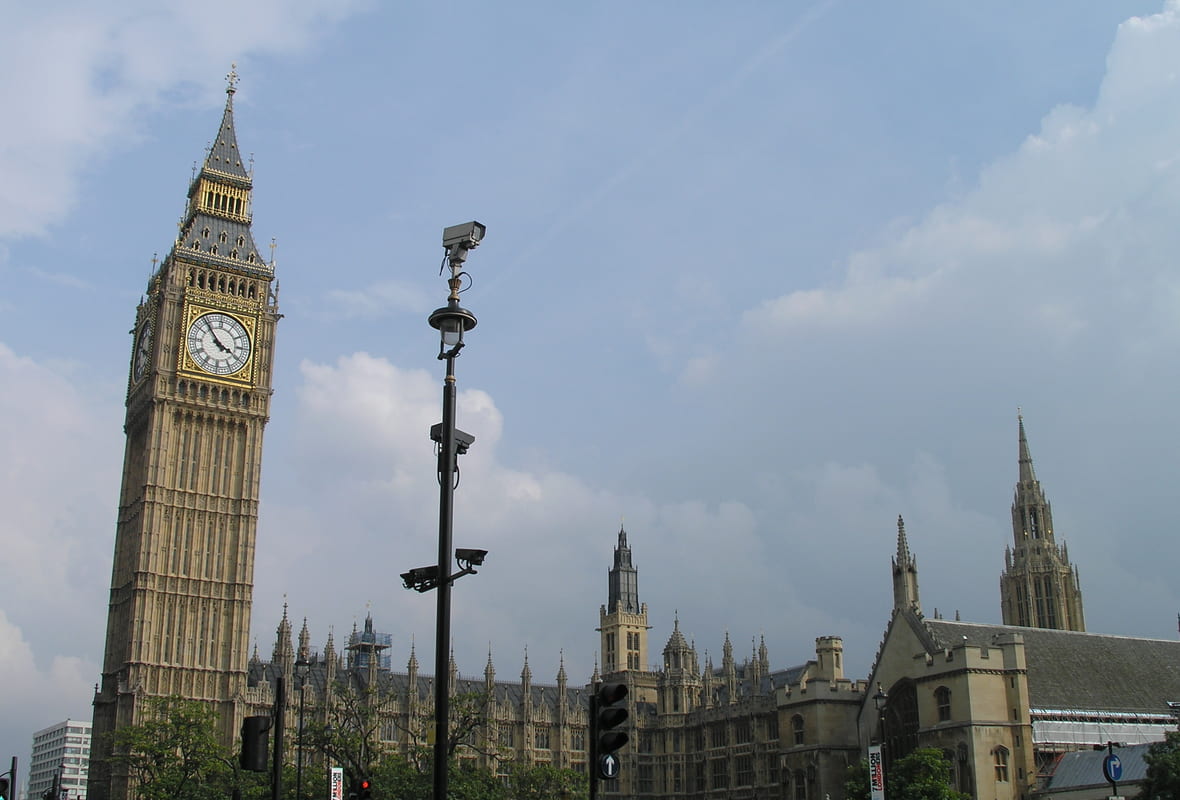Report: 70% of UK Councils Use Chinese Video Surveillance Tech
We sent Freedom of Information (FOI) requests to 52 local councils in the UK. Nearly two thirds of respondents said they owned technology made by controversial Chinese video surveillance firm Hikvision.

UPDATED Feb 23, 2021: Following publication, Tower Hamlets council responded to our FOI and disclosed they did not have any video surveillance technology made by Hikvision or Dahua. They said “the council is aware of the situation with these suppliers and has made a conscious decision just over a year ago to not use them.”
- We sent Freedom of Information (FOI) requests to all 32 London borough councils and the next 20 largest UK city councils.
- 43 councils provided the required information, 9 withheld information or did not respond.
- Of the 43 successful requests, 28 (65%) disclosed they had video surveillance technology made by Hikvision.
- Seven councils revealed they owned technology made by another controversial Chinese company, Dahua.
- Combined, 30 councils (70%) said they owned technology made by Hikvision and/or Dahua.
- Two London councils, Waltham Forest and Hillingdon, said they have used facial recognition technology in the past.
Hikvision Surveillance Cameras & UK Councils
The proliferation of video surveillance cameras manufactured by controversial Chinese firms Hikvision and Dahua in public spaces poses significant privacy risks to citizens around the world.
Our objective with this investigation is to determine the extent to which local authorities in the UK have exposed their residents to these risks by installing IP camera network equipment from the two firms.
Not only are Hikvision and Dahua subject to major privacy concerns due being part-owned by the Chinese state but they also have a poor track record for cybersecurity, such as the critical vulnerability that allowed Hikvision devices to be hijacked remotely without requiring log-in credentials.[1][2][3]
We sent FOI requests to all 32 London borough councils and the next 20 largest UK city councils asking for information regarding their video surveillance networks.
Of the 43 requests that were successful, 28 (65%) disclosed that they owned technology made by Hikvision. The surveillance firm has been accused of being “deeply implicated in the crackdown on Uyghurs in Xinjiang.”[4]
Seven local authorities also disclosed they had technology made by Dahua, which has faced allegations of manufacturing facial recognition technology designed to track Uyghurs.[5]
Both companies face strict trade restrictions in the U.S. due to their alleged role in Xinjiang.
Although the exact number of devices was often not revealed by the councils, our research suggests that millions of pounds of taxpayer funds have been spent on Hikvision and Dahua’s products. Hammersmith & Fulham Council alone disclosed that it owns 1,790 Hikvision cameras.
Public records show Hammersmith & Fulham Council had a contract worth £492,000 with Chroma Vision Limited between 2015 and 2020.[6] Chroma Vision provided Hikvision technology to the council in their capacity as System Integrator during an extensive CCTV overhaul project, according to Hikvision.[7] It’s unlikely, however, that the total value of the contract was for Hikvision’s products alone.
Local authorities have not just bought cameras from the companies. Eleven of the councils also confirmed they owned Digital Video Recorders (DVRs), Network Video Recorders (NVR) and other hardware made by Hikvision.
It is probable some of the NVRs are capable of facial recognition.[8] However, no council confirmed it had used the technology for this purpose. The two facial recognition trials that were confirmed by Waltham Forest and Hillingdon Councils were not linked to Hikvision or Dahua.
Several authorities stated they had plans to replace their Hikvision technology. Camden Council even said that “it is against the Council policy to have assets from Hikvision, Dahua and Huawei,” although they acknowledged a Hikvision DVR was currently in operation.
Wandsworth Council said it was in the process of upgrading its surveillance infrastructure, which currently includes technology produced by Hikvision. “The Council are replacing all its cameras across the borough with an IP network. The system will be supplied by Dahua,” the council said.
Despite the risks to British citizens’ privacy and the controversies surrounding the companies, Hikvision and Dahua’s products still constitute a fundamental part of the UK’s surveillance infrastructure.
In December 2020, we detected over 100,000 active surveillance networks made by Hikvision and Dahua in the UK. The findings of this investigation show that local authorities are responsible, at least in part, for the companies’ huge presence in the UK.
Full Findings
The following table shows responses from UK councils to Freedom of Information requests sent in late 2020 regarding use of surveillance cameras.
London councils are listed first, alphabetically, followed by the UK’s 20 largest city councils.
[1]Glasgow Council confirmed that they had hardware manufactured by Hikvision or Dahua but did not specify whether it was from one or both companies.
[2]Tower Hamlets Council did not provide confirmation they received the FOI request in late 2020, prompting concerns that the original request had not been successfully delivered. We have re-filed the FOI request and will update the findings if/when they respond.
Methodology
We sent Freedom of Information requests to all 32 London borough councils and the next 20 largest city councils in November 2020. All requests contained the same questions and will be made available on the relevant authorities’ websites.
About Top10VPN
We specialize in reviews of virtual private networks (VPNs). We advise our readers on which VPNs will protect their online privacy and security.
We also carry out research and investigations, to raise awareness and inform the general public on digital rights, privacy and security issues around the world.
References
[1] https://ipvm.com/reports/dahua-psa-sia ↩
[2] https://www.csis.org/blogs/technology-policy-blog/hikvision-corporate-governance-and-risks-chinese-technology ↩
[3] https://www.forbes.com/sites/leemathews/2021/09/22/widely-used-hikvision-security-cameras-vulnerable-to-remote-hijacking/ ↩
[4] https://www.aspi.org.au/report/mapping-chinas-tech-giants ↩
[5] https://ipvm.com/reports/dahua-uyghur ↩
[6] https://ipvm.com/reports/dahua-uyghur-warning.html ↩
[7] https://www.lbhf.gov.uk/councillors-and-democracy/data-and-information/transparency/procurement-and-financial-data ↩
[8] https://web.archive.org/web/20201124235714/https://www.hikvision.com/europe/newsroom/success-stories/safe-city/hikvision-helps-london-borough-build-extensive-cctv-solution/ ↩